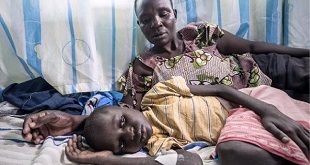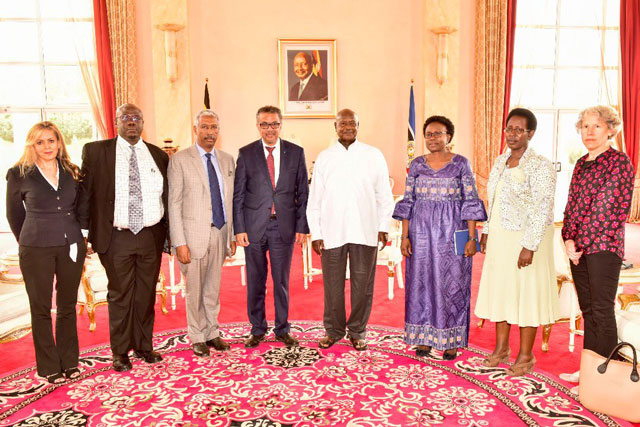
Kampala, Uganda | THE INDEPENDENT | President Yoweri Museveni has met World Health Organization (WHO) Director General, Dr. Tedros Adhanom Ghebreyesus who is in the country to assess the response to the current Ebola outbreak in Kasese District, Western Uganda.
The WHO chief hailed Uganda’s response to the outbreak, saying that “we need to invest in preparedness. The smartest investment is in preparedness”
Dr. Tedros made a stopover in Uganda while on his way from the Democratic Republic of Congo (DRC) where he visited the Ebola hotspots, Butembo and Katwa. This is his third visit to Uganda since the Ebola outbreak was declared in August 2018 in DRC.
He has already pledged continued support to Uganda to contain the latest outbreak and stressed that bipartisan political alignment is key to ending the outbreak in partnership with neigbours.
“From our side, I would like to pledge that we will continue mobilizing global and regional support to control this outbreak as soon as possible. It is not clean until the outbreak in DRC is finished.”
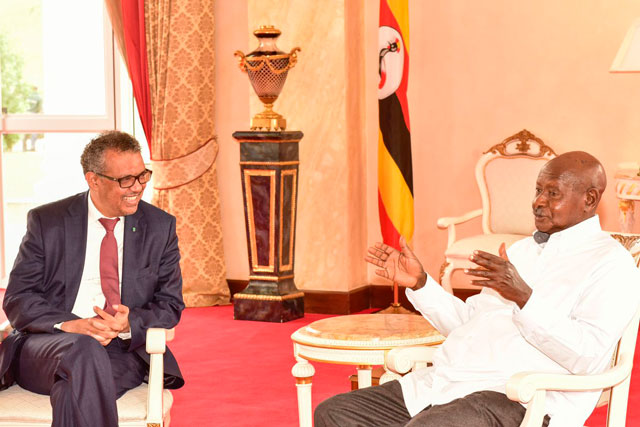
At Monday’s meeting, Dr Tedros assured President Museveni that the vaccine administered to those who had come in contact with the victims has a 97.8% success rate, which has helped contain the situation.
Museveni remarked that, “We are in agreement that the situation has been contained although the public should stay vigilant and observe guidelines issued by health officials. I also agree with him about stepping up our primary health sensitization drives across the country.”
As part of his tour, Dr Tedros visited the Uganda Virus Institute (UVRI) where the three samples taken from cases of Ebola in Uganda were confirmed. The lab remains very instrumental in research, testing and confirming of samples of various diseases, Ebola inclusive.
Just last week, US Ambassador to Uganda Deborah R. Malac handed over a Centres For Disease Control (CDC) office block to UVRI. She commended Uganda Virus Research Institute for strong collaboration in health research and contribution to global health.
CDC supported Uganda as they moved from preparedness to response mode in the ongoing Ebola outbreak.
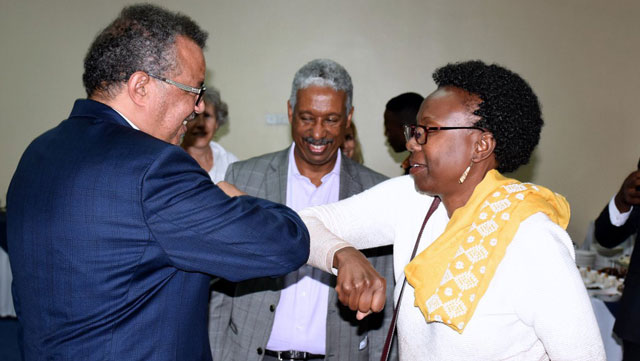
The WHO chief was received at Entebbe a day earlier by the Minister of Health, Dr. Jane Ruth Aceng and her technical teams, Mrs Rosa Malango the UN Resident Representative, Dr Yonas Tegyn the WHO country Rep. Uganda and Dr Lisa Nelson, the Director CDC Uganda.
Dr Tedros commented on the seemingly declining trends in Butembo and Katwa. He said, “There appears to be a decline in Butembo and Katwa areas. However, in my discussions with my colleagues, we agreed to be very careful with optimism but very cautious optimism because the Ebola situation in DRC has been very unpredictable with up and down trends.He further said that Mabalako where the Ebola outbreak was first confirmed in August 2018 has once again become a hot bed of new infections. “Mabalako is now the hottest place where cases actually came from to Uganda” Dr Tedros noted.
Dr. Tedros explained that “I have accepted the assessment of the WHO Emergency Committee that although the Ebola outbreak in DRC is an emergency in the country and the region, it does not currently constitute a Public Health Emergency of International Concern(PHEIC).”
He also revealed that in December 2018, WHO requested MERCK to produce more doses of the ‘Ebola-rVSV’ vaccine, to continue supporting the outbreak.
In her remarks, the Minister of Health, Dr. Jane Ruth Aceng said that, the transition from a preparedness mode to a response mode was not difficult given that Ministry of health and partners had invested heavily in ten months of preparations to handle any eventualities. However, she said, “the challenge is that we now have to again mobilize resources for the response phase.
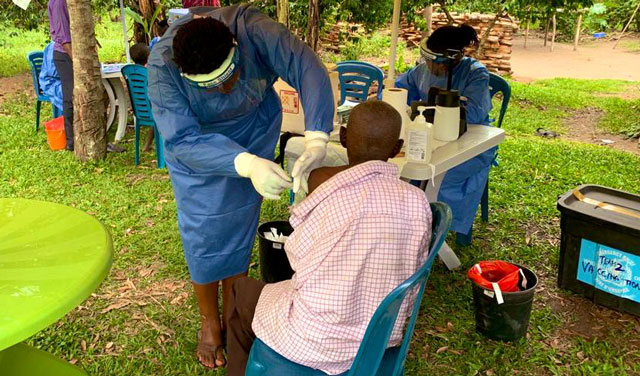
She appreciated the WHO for the support with the Ebola vaccines during the preparedness phase, where over 4,200 frontline health workers and other workers were vaccinated in Uganda.
“During this response phase, we have received a total of 3400 doses of the vaccine. A donation of 400 doses from the DRC as a quick initial measure to kick start vaccination of contacts, frontline health workers and other workers who were not vaccinated, and an additional 3,000 doses sent in by WHO. All these arrived very timely and vaccinations commenced last Saturday, 15 June 2019 where over 20 contacts were vaccinated. Today, we expected to vaccinate over 70 people and the process will continue.”
Dr Aceng appreciated the efforts and contributions of all partners in Uganda towards the containment of the Ebola outbreak.
The UN resident Coordinator, Rosa Malango appreciated the political commitment of Government in responding to emergencies. “I have discussed with Dr. Yonas, and agreed to meet on Monday 17th June 2019, to once again analyze the gaps and identify where support is needed in terms of financial resources” she said.
As of now, Uganda has no confirmed case of Ebola. Two suspect cases were under isolation in Bwera Ebola Treatment Unit as of Sunday 16th June. One of the suspect cases tested negative for Ebola and has been discharged, while results of the other suspect cases is pending.
Ministry of Health remains on high alert and appeals to the population to remain calm and cooperate with the response teams on the ground.
| YEAR | LOCATION | CASES | DEATHS | STRAIN |
| 2000-2001 | Gulu | 425 | 224 | Sudan ebolavarius |
| 2007-2008 | Bundibugyo | 131 | 42 | Bundibugyo |
| 2011 | Luwero | 1 | 1 | Sudan |
| 2012 | Kibaale | 11 | 4 | Sudan |
| 2012-13 | Luwero, Jinja
& Nakasongola |
6 | 3 | Sudan |
| 2019 | Kasese | 3 | 3 | Ebola Zaire |
| IPL |
Meanwhile, a man believed to be a high risk Ebola suspect is still missing, according to the World Health Organisation-WHO. The suspect is believed to have had contact with the three confirmed cases confirmed Ebola cases from the same family.
Officials are not sure whether he returned to DRC or is still in Uganda.
According to WHO, efforts to trace the male suspect since last week have been futile. There are 90 contacts under follow up and none has developed symptoms to date.
Benjamin Sensasi, a WHO Health and Communications Officer, says contact tracing teams are still looking for the suspect. “He could have gone back to DRC but if he is in Uganda, our tracers will find him.”
The high risk suspect is said to have first traveled to Democratic Republic of Congo-DRC to bury his father, a pastor who succumbed to Ebola. He then crossed back into Uganda with his family using the porous at Mpondwe market in Kasese district.
The three confirmed Ebola cases that he had contact with have all passed away and were his relatives. The latest victim, a three year old boy passed away on June 13th 2019 as he was being repatriated to DRC to receive treatment. It is now seven days since the first confirmed case was announced.
According to Sensasi, it is possible that the missing Ebola suspected cases crossed back into DRC using one of the many porous entries.
@DrTedros , @tegegny @WHO are now on a tour of @UVRIug where the three samples taken from cases of Ebola in Uganda were comfirmed. The lab remains very instrumental in research, testing and confirming of samples of various diseases #Ebola inclusive. #Uganda. pic.twitter.com/yUfjndmbaC
— WHO Uganda (@WHOUganda) June 17, 2019
The other family members that the high risk suspect is believed to have entered Uganda with, including a six month old baby, maid plus the father of the children were repatriated back to DRC on Thursday.
The four were sent back to receive Ebola therapeutic treatments in case they develop symptoms of the disease. The treatments are not available in Uganda. Ebola is a highly infectious disease that can be spread through contact with body fluids like sweat, blood, vomit, tears and semen of an infected person.
According to doctors, it takes 21 days on average for person infected with Ebola to show symptoms like vomiting blood, bloody diarrhea, abdominal and muscle pains, headaches and fevers. So far, 98 people who had contact with the three confirmed cases or contacts are being monitored by health teams in Kasese. Emmanuel Ainebyoona, the Senior Public Relations Officer Ministry of Health, says that the contacts haven’t shown any Ebola like symptoms.
“We are monitoring all contacts at their homes and so far, none of them has shown symptoms of having Ebola.” Ring vaccination of all contacts and frontline health workers begun on Saturday at Bwera General Hospital. On Sunday, vaccination took place at Kagando hospital and is scheduled to move to other parts of the district and country.
******
URN & WHO
 The Independent Uganda: You get the Truth we Pay the Price
The Independent Uganda: You get the Truth we Pay the Price

